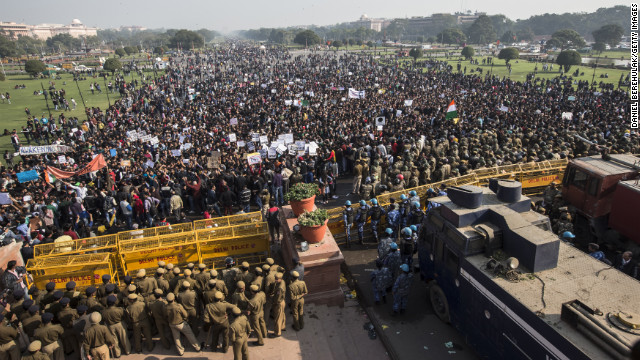When contemplating the question Fareed Zakaria’s headline poses: Is this the start of India’s ‘Arab Spring’? other questions immediate ensue: is this a relevant question to be asking? Moreover, do we even want an Indian ‘Arab Spring’? For many of its onlookers the Arab Spring has devolved from being idealistically perpetuated as a possible ‘fourth wave of democratization’ to nothing more than a ‘false start.’ (Diamond, Larry. 2011 May 22. Foreign Affairs) Given its problematic status in the terminology of political science, I do not appreciate Zakaria’s phrasing of the issue at hand, but the substantive value of the implications he proffers pertaining to it is enough for me to overlook his semantic choices.
By now, I am sure the widespread protests waged throughout India in the weeks following the rape and subsequent death of a 23-year-old unnamed New Delhi woman is old news to most of you. What this story lacks in currency, however, it makes up for in the expediency of its subject matter. I hope that most of you have encountered, at some point in your studies, the topic of gender equality and the related challenges it presents, both historically, and in contemporary times. More disturbing than the well publicized New Delhi gang rape itself is the systemic problem it is representative of. In India, there were more than 24,000 registered rapes in 2011, probably a gross underestimate when factoring in the number of unregistered rapes that undoubtedly occur. Rape is unfortunately only one symptom, albeit a horrifying one, of a much larger problem in the general attitudes of men and women alike throughout India and many of its Asian neighbour: the subjugation of the female gender.
When Zakaria writes “Now it’s asking for basic rights for women. In a way, this is India’s Arab Spring,” it brings to mind particular feminist strands of political thought. Those like Pateman have characterized gender equality as being not only indicative of democratic health, but also a necessary prerequisite for a true liberal democracy to exist. Normatively, this makes sense to me: the exclusion and oppression of any members of a collective entity is enough to make that entity essentially non-democratic. Is a change in attitudes towards women a necessary precursor for democratic transitions or for the proper establishment of democratic institutions? In the Indian context, the answer appears to be a definitive yes. What do you think?

Mass civil unrest following the rape and subsequent death of a 23-year-old paramedical student in New Delhi